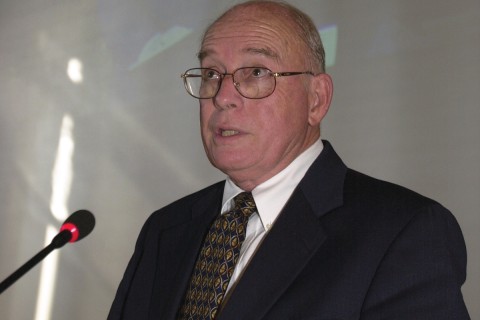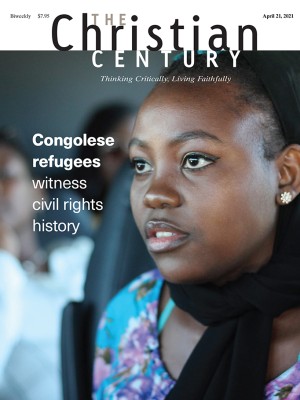Because of Paul Crow, I’m still a pastor
The ecumenical leader who talked me out of burning my ordination certificate

Paul Crow died on January 23, 2021. Born in the small town of Lanett in eastern Alabama, he became a force in the international ecumenical movement. He served as the ecumenical representative of the Christian Church (Disciples of Christ) throughout the world. As general secretary of the Consultation on Church Union and as president of the Council on Christian Unity, Paul traveled to the World Council of Churches and the Ecumenical Institute at Bossey in Geneva. He had audiences with the pope at the Vatican. His life work and passion was to remind Christians of Jesus’ prayer “that they may be one.”
Because of Paul, I remain a Disciples pastor today. He was there at the right place and the right time to express the ecumenical vision that I needed to hear.
The word ecumenism was not always in my lexicon. I was a farmer’s daughter from the Midwest who violated the teachings of my home church by daring to become clergy. I had heard God say to my 11-year-old soul at church camp that I was to become a pastor. I had responded during the altar call fully aware I would not become a church secretary, singing evangelist, or missionary—the only roles open for women to serve. I would become a pastor. I kept my secret until the doors opened in my 30s to follow this dream to seminary.
Read our latest issue or browse back issues.
At seminary I encountered the ecumenical movement and soon met Paul. He believed that by hard work, difficult conversations, and especially a reliance on grace, a united church could help ensure a world of peace and justice. To that end, he talked ecumenism constantly, in seminary classrooms and on the world stage. Meanwhile he actively groomed the next generation of leaders who could carry the ecumenical movement forward. The movement he helped create was committed to respectful dialogue to reach common understandings of the mission of the church as the body of Christ.
Paul was not naive about the difficulty of ecumenical work. He noted in 1999 that during his time with the Consultation on Church Union, the organization had suffered from “caricatures, misinformed judgments, and denominational arrogance.” Yet he never wavered from his commitment to the basic premise that for the church to have worldwide credibility and relevance, it had to overcome its own divisions.
The expansiveness of this vision grabbed my attention while I was in seminary. Given my history in a loving but exclusionary congregation, I struggled with whether the body of Christ could be represented by someone with a female body. When seminary confirmed my vocational call, I was still uncertain. In the early 1980s I wondered if any church would hire a woman. I voiced this hesitation to the Disciples committee that was overseeing my candidacy while I was still in seminary. The only other woman in the room, who was herself clergy, responded, “Don’t worry, Beverly; there are always desperate churches.” Although her words seemed depressing, I also heard God telling me not to worry. All would be well. The feast table had been prepared, and the invitation was to everyone—women included.
In the years after my ordination, I watched Paul as he influenced Christians of all flavors to understand one another’s traditions, rituals, and teachings and to accept that we are all part of the body of Christ. I had just begun my second pastorate position when the Disciples denomination nominated Michael Kinnamon as its next general minister and president. Like Paul, with whom he had worked, Kinnamon had a passion for ecumenism and had publicly extended that ecumenical spirit to include the full acceptance of LGBTQ people. This nomination seemed like a clear and obvious sign that the Disciples were intentional about embracing the inclusivity of the gospel, and my lingering question of being included, as a woman, in the body of Christ was being answered. Surely the Disciples of Christ was the denomination where I belonged.
Then the denominational election happened. Congregations that did not embrace the vision of inclusivity at the table showed up to vote against Kinnamon. Rarely interested in General Assembly proceedings previously, they now made their presence known by declaring that his gospel vision was too broad. The vote was close. There was a recount. Kinnamon lost.
I was devastated, but I was also prepared. Before I had left for the General Assembly, I had removed my ordination certificate from its frame. As I sat in the auditorium, it was in my briefcase along with a book of matches and a candle. In the event this election went south, I was prepared to say good-bye to this denomination. I would wipe the dust off my sandals and move on to the next town, as Jesus had commanded. I was prepared to destroy this symbol of the culmination of my years of preparation, this sign of external validation. I had not been accepted by my home church. My own family had looked askance at my choice to be clergy, and my father had boycotted my ordination. I had felt excluded from the table because I was a woman. I could not accept the exclusion of anyone else.
Now, after the votes were tallied, I saw the tears and heard the sobs of the stunned Christians on the bleachers around me. I stumbled down the stairs, clutching my briefcase. The ecumenical causes of Kinnamon and Crow and others seemed lost in this election, and I had lost my new home. I wept. I didn’t know where to burn my beloved ordination certificate, but it was clear I had to say good-bye to yet one more group of Christians who had closed the door on my call. If the gospel is not about everyone at the table, then it is not my gospel. I had to leave the denomination.
I went to the exhibit hall, where the LGBTQ materials were on display, and there was Paul, a man I now counted as my mentor. I showed him my certificate and told him I felt compelled to burn it. I could never pastor in a church that slammed doors shut—on other Christians, on me, on my gay friends. In anguish I told him my story.
Paul then woke me up with a few wise words: “You can burn this certificate, but it will change nothing.” He had my immediate attention. “You were ordained into the wider Christian Church. Our denomination may have signed this piece of paper, but you were called to the church that is greater than those of us assembled here. Your ordination call is from God, not from us. And you have answered it. Nothing has changed in God’s eyes, even if you burn this piece of paper.”
Paul had made inclusion his life’s work. He knew the importance of challenging the barriers that divide us, for only then do we demonstrate the gospel’s promise of divine grace. He, and Kinnamon after him, lived the ideal of hospitality for all, including LGBTQ people and women. The invitation goes out to everyone. All are welcome at the banquet table.
I did not expect this powerful ecumenical statement, but I did hear it, through a hurting heart. The church may or may not live up to its vision of unity—but that does not discount the vision. The church may continue to struggle with who is with us and who is not—but with God there is no such struggle. Paul knew this simple truth. He lived it. It was in his bones. He breathed it until he breathed no longer. Now I trust that the God who never closes doors has opened them wide to include this devout and loyal servant.
A version of this article appears in the print edition under the title “Unity for all.”





